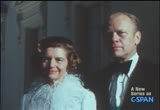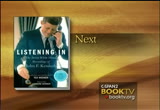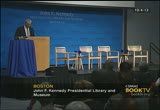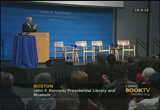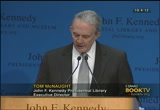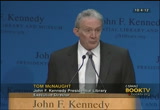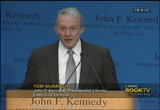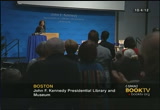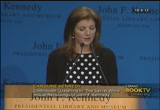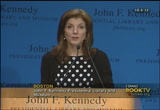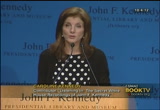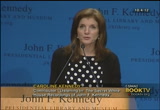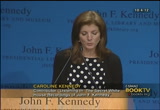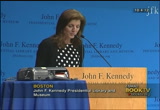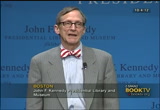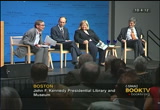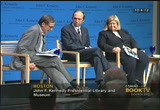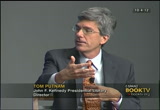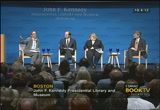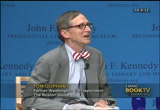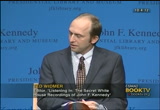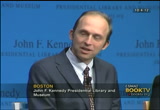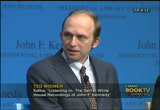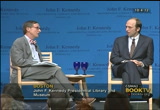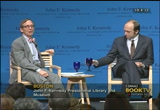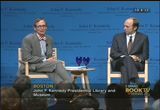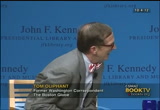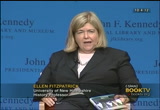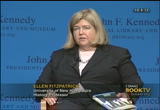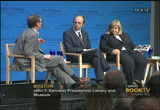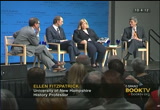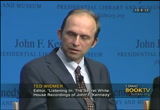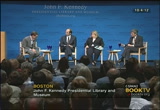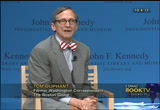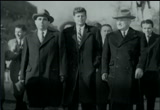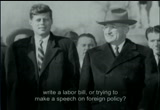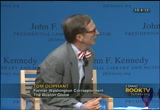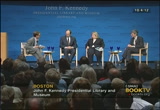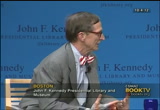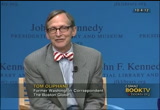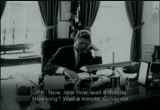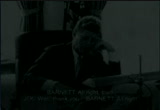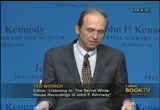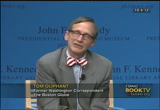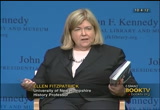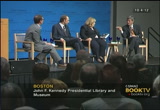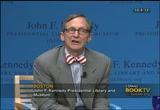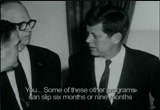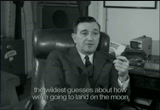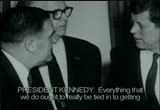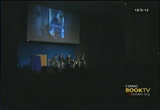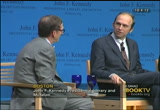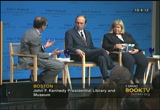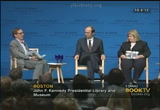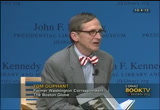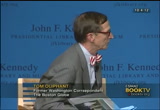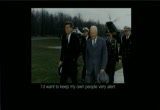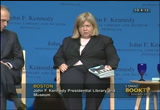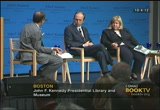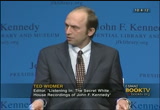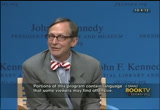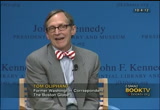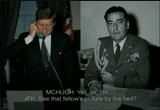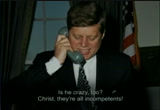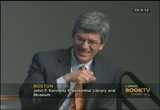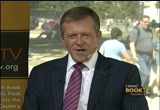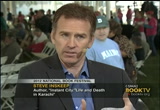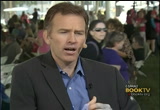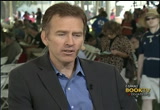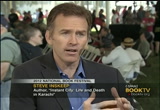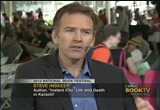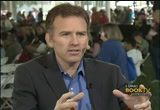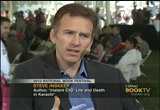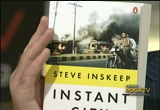tv Book TV CSPAN December 25, 2012 7:00pm-8:15pm EST
7:00 pm
>> i don't on the president's realistically have that kind of impact on the way we live our lives. >> is walking on the white house grounds, i am constantly reminded about all of the people who have lived there before, and particularly, all of the women. >> first ladies of america. influence and image. a new series on c-span. produced in association with the white house historical association. started on presidents' day, february 18. >> next on booktv, caroline kennedy presents a panel discussion from the oval office and cabinet in july 1962 great tapes include numerous discussions on topics of the
7:01 pm
day, including the q1 missile crisis in vietnam. this is about one hour. >> good evening, ladies and gentlemen. i am tommy nottingham the director of the jfk library foundation. tom putnam is the director of the presidential museum and i thank you all for coming here this evening. let me begin by acknowledging generous underwriters of the kennedy form, bank of america, boston capital, global institute, the boston foundation, and the media partners. tonight's forum is a very special one for those who work at the john f. kennedy library and the same.
7:02 pm
the publication of the "listening in", which is now on sale in our museum store, was simply not possible if not for the incredible skills and talent and professionalism and dedication of our library staff and government employees. there is one person in particular, one person that tom putnam and i would like to acknowledge. and it isn't archivist that has been overseeing the classification of these recordings and who knows more about these 265 hours of president can '80s taped conversation than any other american. so i ask that you please join us in thanking and acknowledging his work here at the kennedy library. [applause]
7:03 pm
we have a wonderful panel with us tonight. joining us for tonight's discussion as historian ted winters, who so carefully selected the most compelling of his remarkable recordings and wrote detailed annotations of the transcripts. with us also is owen fitzpatrick, a professor of history at the university of new hampshire, also a wonderful and frequent contributor kennedy form. my colleague and friend, tom putnam, who brings such energy to library's mission of preserving our nation's history. and our good friend we always love having with us, john.
7:04 pm
the president used a dictaphone to record his personal observations following key meetings and events. we thought they would all enjoy in the actual dictaphone that he used as senator before becoming president. we put it on the stage and we invite you can look at it after the form. this is the real thing, this is what he used in the senate. the one he used as president is now in the archives. over the years come we have welcomed many individuals to the state who have worked for president kennedy. those who vote for him and served in navy and knew him as a friend. they all have their own take and interpretation of what happened, their own spin. now it is the term of president kennedy. a principal speaker tonight, of which we invite you to listen to. it is that of president kennedy. many see this is the one president kennedy never had the
7:05 pm
opportunity to write. it is now my great pleasure to introduce the individual who is most responsible for his writing and publication. it was caroline kennedy who first conceived the idea of the book that presented some of the most compelling and fascinating excerpts of these publications. it was caroline who championship championship -- champion it. in caroline's eyes, she had detail and accuracy. she is the author of nine bestseller books on politics and poetry. you can make that 10 best-selling books. we just learned that her new book is on "the new york times." [applause]
7:06 pm
caroline serves as the president of the kennedy library foundation which provides the financial support for this library. at her request, all proceeds and revenues from this sale of the book will go to the kennedy library to support its programs. have i mentioned that this book is now on sale at our museum? [laughter] caroline has graciously agreed to remain behind us forum to sign the book. it is now my great pleasure to welcome to the stage caroline kennedy. [applause] >> hello, everybody. thank you all. thank you so much. welcome all of you. it's wonderful to have you here at the kennedy library. it means a great deal to me that
7:07 pm
50 years after my father's presidency, so many people still share his ideals and vision for america. to me, his greatest legacy are the people that he inspired and public service. almost everyday, someone tells me that they ran for office and got involved in the community and join the peace corps, volunteered in the inner city or in outer space because he asked them to give back to this country that has given us all so much. generation inspired has passed that commitment on to their children and grandchildren in the continuity of spirit that continues to work for a more just and peaceful world. as we approached the 50th anniversary, my family thought a good deal about how to best celebrate my father service and patriotism. we recognize that his time is becoming part of history. not living memory. that brings opportunities as
7:08 pm
well as challenges. both my parents loved history and and they pass it on to me to my brother, john. my father read voraciously about the civil war, english parliamentary history and the world wars of the 20th century. my mother preferred the ancient world in 18th century europe. for them come in the past was not a tie and a welfare. but full of exciting people, rate heroes and heroines, and defense that could teach us a great deal about our own times. here at the library we decided to concentrate on making history of the kennedy administration accessible to the widest possible audience. in the hope that the treasures of the kennedy library will inspire people growing up today in the same way the stories of the past spired my parents. on the 50th anniversary of my father's inauguration, in january 2001, we launched the digital archive from putting all
7:09 pm
the presents papers and correspondence and memos and photograph and film online, so that people can have access online to this material. not just scholars who come to boston. we created the president's desk, an interactive tool, so that kids can experience most important moments of the presidency. and we translated my father's major addresses into 40 languages online. this is the culmination of digitizing and creating the digital presidential archives. last fall, we released my mother is archives, "historic conversations with john f. kenned", now we are publishing my father's archives, "listening
7:10 pm
in: the secret white house recordings of john f. kennedy." he taped hours of meetings and phone calls in dictation between july 1962 and november 1963. you'll hear more about this from our panelists. for the taping system was top secret. it seems that the only people who knew for certain of its existence were my father, his secretary, and the secret service agent who installed it. that is until president nixon made infamous. [applause] of the presidential recording systems were revealed. against the backdrop of watergate, taping can seem problematic. but it is a unique and invaluable resource. on these tapes, history unfolds real-time in the most dramatic possible way. here are the confrontations of the civil rights movement and the life decisions being made during the cuban missile crisis.
7:11 pm
people often ask me why my fatherfather install the systems. as a lover of history, i know he would've been talk of this new technology as a way of keeping an accurate record of events for the memoir he planned to write after leaving office. after the bay of pigs, people say he wanted to be able to remember who said what in case they later changed their tune. [laughter] the wonderful thing about this book is that although much of this material has been available, it has not been easily acceptable until now. the original recordings of of varying quality, and it is not always clear who is speaking in meetings. working with our outstanding archivist, historian ed widmer did an extraordinary job. in election season, i find it fascinating to listen to my
7:12 pm
father talk about what kind of person succeeds in politics. he believed the time for changing, and he was right for the time. it is interesting to apply his standards to the current campaign. he talks about the odds of people with money succeeding in politics and about whether objects come to play. find his standards to today, i know where i come down. i encourage you to make up your own mind. as his child, i cherish the parts were my brother and i appear on the tape. i remember walking into the office before school in the morning and visiting him in the afternoon so that we could play under his desk. it was the highlight of the day for john and me. and the delight in my father's voice shows that he felt the same way. i felt fortunate to be able to listen in on his meetings and to be able to hear his mind at work. his tone of voice, his chuckle and frustration, and most of hall, his sense of purpose.
7:13 pm
what comes through is that politics is a way of his solving problems and nothing is more rewarding than giving part of one's life to serving his country. i hope you will be inspired by his taste answer his call. thank you. [applause] >> how are you all doing? >> hello, i am ted oliphant, and we have a treat for you. [applause] i know caroline kennedy says all the time, because it's true, she talks about the impact that president kennedy has had on so many lives. your moderator included. there is one thing i wanted to ask, and that is he is so
7:14 pm
fascinating, both in what he said and what he did, that it almost seems as though his words have relevant impact today. and they do. i have this tape that shows you how many gems or there are in him. it is a meeting with general douglas macarthur, by then retired in the oval office, in august of 1962. here's president kennedy in 1962 speaking to us today. do you know this fellow romney? [laughter] what you know about romney? have you met him? well, i'm still asking these questions all these years later. [laughter] [applause] we have a tough job up here
7:15 pm
tonight. the kind time the presses in on us tonight. i will be the best to be the kind of aggressive moderator that you may not have seen on television. [laughter] [applause] last night, in fact. [laughter] [applause] we are going to introduce this fascinating collection of more than 245 hours of tapes plus 17 hours of did the bulls and telephone conversations. then we will play some. we will play some of them briefly, and we won't have time to discuss them in depth, but we will have time to have a little discussion after each day. with that, let's get started. mr. putman, set the scene. how long has the library and in possession of these?
7:16 pm
how did this happen? and what was done -- describe the process we have done to prepare them for the public use? >> well, let me violate your first rule right away. i also want to thank caroline kennedy for all of the initiatives that she has ascribed to make this the coming edge institution that it is. we really can do without her leadership and support. also, my colleague, mr. tom mcnaught. the work that we have done to not be possible without him. but after the assassination, the taping was dismantled. and everyone said that the secretary mood of the executive office building. the tapes went to a variety of storage locations.
7:17 pm
robert kennedy actually used them for his book, "thirteen days". there is the reel to reel tapes and the dictaphone. 1983 so we have the first opening, and it is really a fact that the system was actually installed and 62, and 2012, we open and declassify the very last tape. but the entire collection is now open. this book that he had worked on is was the first one to include all of the tapes. >> and if one of these fine people want to go browsing, where would they go?
7:18 pm
they would go here. >> that's right. people can go to her digital archives now uncertain. on the educational portion of our website, we have a whole website where they come to life and you get to do activities on him. you can actually come to our research room. some people still come to our research room. >> so the word accessible does come to mind? >> absolutely. >> by the way, you should really appreciate what this guy did. anybody who has ever had to work with research materials, above all tape recordings of offers conversations of any kind, maybe has appreciation of what horrible drudgery it is to go through this. on behalf of history, ted, thank you very much for all you have done. i want you to explain something more about the system. particularly the way it was set up in the cabinet room, the oval
7:19 pm
office, at least. at least one telephone. describe it. there was a switch in the knee part of the desk. >> i will answer your question. but like answer your question. the lifetime, also like to intimate my thanks to this great library for what it has done. the library could not have been more supportive at every level, beginning with caroline and the constant support of tom mcnaught and tom putman. it was just essential at every tough moment. all of the staff, mary rose and bill and lori, steve and sharon in the library. it is a great team working here. i am very grateful to all of
7:20 pm
them. getting back to the system, caroline mentioned playing in the desk. it was exactly in the space underneath the desk, the and the whole system was in there next to the knee hole. decades later, it was described where the microphones were. >> if i could interrupt, the agent had bestial service in the secret service. it made this assignment interesting. >> his job was to protect president kennedy from electronic surveillance. [laughter] so he was trying to keep the outside world from listening in, but he was tapped to help president kennedy listen in on his own conversations. >> it was 22 years before 1984.
7:21 pm
>> that's right, one microphone was in the knee hole and the other one was in the cabinet room not far from the oval office. there were some drapes, and he put a couple of microphones in the drapes. in his oral history he mentions that he put microphones in the residence. >> the other question that this naturally occurred, is it possible to find any documentary record of a decision to do this? were things that preceded doing it? do you know anything about what produced this? >> i do not know of any documentation. he speculates that it was related to the cold war. it was also regulated with the
7:22 pm
bay of pigs also. it was 1962 that this system went in. without knowing exactly, he was getting ready to write a memoir. he was well into his presidency and he said he wanted to put this in his memoir. so this was the idea of a historian getting ready to write. >> do you put much credence in the idea that after the bay of pigs, and of course during it, that a great deal of what the president was told, especially before it happened, did not turn out to be particularly accurate, and that he did want this as a check on advisers are not. >> i think that was an added bonus. i think it rings true most
7:23 pm
clearly. but he was getting a lot of advice about military operations and the bay of pigs had awakened him to this problem. cuba was heating up already. even a few months before the crisis. it turned out to be highly capricious to have the taping system in place. because we have a nearly perfect record of all the conversations. a record of extraordinary value and the conversations include conversations by his top military adviser after he left the room, in which a pretty critical of him. we include a section of that as well in a pretty foul mouth about it, too? >> yes, that's right. >> the final question before i get the professor's interpretation and then we will hear some videotapes -- the president had to make a conscious decision to put the switch in the desk in the
7:24 pm
cabinet room and on the phones, and obviously for the dictaphone. having absorbed all of this, can you find or discern any pattern to his switch flipping? >> is a historian that appreciates quality of the conversations, i think we knew and would press the pushbutton in advance of an important meeting. having said that, i don't know about recordings that were not made. but the ones that were made were of very high-quality meetings meant yes, we will listen to one recording of the most deliciously heady of things.
7:25 pm
>> only one thing -- scott brown, i'm afraid. [laughter] the great story there, the last one to do this, and he did it successfully with pat moynihan in new york. he ran against william buckley's brother jim. at the first debate, buckley turned to him and starts bashing comes right out of the court with moynihan. he looks up and says, oh, the mudslinging begins. [laughter] >> thank you. tell us and generalize for us, historians have not typically have access to anything resembling this kind of material with the exception of nixon and
7:26 pm
whatever. how were we to regard the source of information? what is it? you have to check it? is a good way to his? >> i think it is good to go. what is wonderful about these tapes is the immediacy of them. also, we do have other presidential tapes to listen to. one of the things that i actually love about these tapes of the conversations between president kennedy and his brother. when you listen to the nixon tapes, they have a certain quality. then you listen to the two kennedy brothers talking about how mean this guy is. it sounds so quaint as opposed to some of what we heard on the
7:27 pm
nixon tapes. i'm sure that there were other words used to describe problematic figures. but it really brings you back to a different moment sometimes. >> is impossible to get some insight -- maybe fresh insight about how a president works? in other words, if you have access to his behavior in the oval office, giving and taking off and at the moment of decision, how does that add to the record? >> i think it pushes it out. it is the way that we bring president kennedy to life in a way that is on stage. he was masterful in his use of
7:28 pm
television. he was our first television president, so we have a lot of media about him. there's something about this. one of the things that i found moving about the book is the way in which a portrait of kennedy that emerges from these tapes is so consistent with the portrait that has been drawn over many years of him as someone who is thoughtful and funny and aggressive and warm. we could go on a whole list of adjectives. but it's a kind of veracity that is very powerful. it would be very helpful for students who are trying to learn about president kennedy in what he was like as president. >> did you find his mastery of detail unusual for a president in a typical board president? how did he handle subject
7:29 pm
matter? this stuff in the book, it's all over the lot, you should know. so you get to see him and hear him in a number of settings. i will make a statement in lieu of the question. he seems extraordinarily and in control. >> he was extremely well-informed. he had a very searching intellect or in some presidents are more authoritative in this way than others. the range of issues that he was dealing with -- they are very impressive. i think his ability to sort through all the dimensions of the problem -- on specific issues, one of the things that emerges is how cautious he was about military intervention.
7:30 pm
really trying to find a moderate way through. a more specific issues you see the substance of the way his mind worked. >> indeed. >> any disagreement before we go to the tapes? >> i agree completely. with civil rights, a great story is told. there is not much time trying to find a moderate path in the middle of 1962. it was extremely difficult politically and very unpopular. finding a courageous path forward in the ones with leadership. >> it seems to be the one area, civil rights, where in his
7:31 pm
conversations he is acutely aware that, like johnson was later, that there is absolutely no political gain in that at all. >> that's right. >> yet he is doing it anyway. >> and he took his time. we have discussions about civil rights in the campaign in 1960 or early in the administration and then it starts to move. >> he saw the presidency at the center of action and he didn't have the chief of staff. he wanted to have information directly. >> so here we go. we have one, two, three, four, five, six tapes. the first was recorded -- it is
7:32 pm
dimmer than the others. is 30 days after he declared his candidacy in the caucus room at the united states senate. it is mrs. kennedy and president kennedy and then bradley and his wife antonia, who we all called toni. and one of the reporters who later became a public official of more than little consequence, jim cannon, who served presidents were. they decided that evening to make a tape about not his decision to run for the kind of person that he is, more than anything. to have a listen and then we will try to talk a little bit about it.
7:35 pm
7:36 pm
>> yes, but this dinner party conversation. it was how much he enjoyed politics. his passion for it. this is true of the tapes in the oval office as well. the delighted he took in political life. in his conception of the presidency, he was absolutely right. nineteenth century from the presidents didn't do much. they were involved in tariffs and the slavery issue and i was very crucial. but by the time he sought the presidency, we were seen as a kind of master institution to political rights. >> okay. feel free to elaborate. >> i would love to. i felt lucky to hear the first time. it was only given to the library in 2007, five years ago.
7:37 pm
we are still gathering the material to study this presidency. it is full of ambition. it is also full -- i wouldn't say self-doubt, but self-knowledge, that he very interestingly talks about being a different politician and his grandfather. and he was famously spent upon a table and sing sweet online. he would love to be in a crowd. john f. kennedy was an extremely different kind of a politician. >> the only element i forgot to add is the zest for being in the center of national light. for its own intrinsic merits. quite apart from any and this
7:38 pm
guy has a zest for life that is palpable. now he has won the election. one of the first crises of the desegregation of southern universities -- the university of alabama initially. this is what was from going on 50 years ago, almost to the day. i was just upstairs talking about it. if you have ever been to the civil rights museum in memphis, tennessee, they have these recordings. but this is the president
7:39 pm
7:42 pm
>> i am so glad we got to hear this. you can hear a lot in that tone, something you can't always get from reading the transcripts. that is a very important conversation. he is asserting the right of the president of the united states to order the governor and to restore order in a perilous situation, james meredith is in danger for his life because of the angry crowds surging around. parenthetically, he had been inspired to register for the university of mississippi when he heard president kennedy's inaugural address. there is so much history in the air before playing the tape. he said i wish we could hear the chickens. the previous phone call, they are still talking about civil rights, but they are politicians. governor barnett says thank you for what you have done for our poultry program. and president kennedy -- he stifles laugh. he campell
7:43 pm
you can believe this blowhard said that. [laughter] but they are not being polite anymore. they are not dancing around. >> i should add a story that at the time, governor barnett was known as a dim hope. [laughter] two years before, during the presidential campaign, one of the flashpoints of the debate involved to national chinese islands. right after this argument erupted, ralph barnett and the reporters asked him, governor, what about these two islands? and he looked around and sort of
7:44 pm
looked lost. and he said the two fellows i put on the game commission take care of that? [laughter] [applause] but if you hear the tape, when barnett brings up the poultry program, you can sort of hear president kennedy laughing. >> part of the context this statement when he said, you know, don't make any speeches. not until you talk to me first. they have had to deal with the kennedy brothers, this elaborate scheme by which they had mirrored at registered in jackson. and then we have barnett at the football game that very day, standing up, giving this speech
7:45 pm
calling to resist the journey of the federal government. so he has nullification and interposition. >> he seems to have so like a cheap suit on the telethon. [laughter] to but he really didn't. that is what led the president to stand in. federal troops and national guard. >> one of my favorite stories about president kennedy is the was supposed to say to an equally bad segregationist, i don't care if you denounce me in public. just don't you dare do it in private. [laughter] >> that's interesting. robert kennedy says these were the first in the situation.
7:46 pm
>> that's right. it is the first in the civil rights museum. watching people listen to governor barnett, at least now that he can no longer do any harm. the next tape involves a subject that we love, but space program. but it is what a real president sounds like. this is president kennedy meeting in 1962. one year and a half after he made the announcement in the state of the union speech of the goal to get to the moon by the end of the decade. he is meeting with a reluctant leader of nasa, james webb. listen closely and see if you can get a sense of how a real president pushes his government.
7:50 pm
7:51 pm
i think it is wonderful to see him really getting his point across here. there was no way this was going to be one of the great scientific experiments. and obviously, advisers were interested in all of the different intellectual dimensions of it. he had a very clear goal. >> he is leaving, there is no doubt about that. i give him credit for hiring people brave enough to talk to him. the book also gives the transcript of a conversation a year later. the smart people have almost reversed positions. he is saying it is too
7:52 pm
dangerous, should we think more about it. should we think more about the science about it. they are saying that we should spin off more great technology. it's another great competition. >> i love the change in mr. webb a year later. the president is basically asking, is this a top priority. and he said oh, absolutely. [laughter] >> i think he also asks how else it can be done. is there a way of doing this. perhaps this shifts from kennedy's own cold war. >> part of what i want to understand, if this meeting is taking place about a year and a half after the state of the union speech, here it is a year and a half later, and the government isn't really on board. and you think, my god.
7:53 pm
>> i can confirm that that is often the case. but the written document i've seen on display in this library, why is it being done right now? what we do in the next 24 hours. he really was on it. but i think it's worth pointing out that in 1963, which it was a very different year from 1962. but the cold war had calm down a big notch after the cuban missile crisis. and khrushchev and kennedy were working closely together to keep it that way. and he proposed the russians and the americans work together. the russians did not accept that. it is interesting to know that he proposed that. >> to bring another part of the space race to life, i would like to invite everyone to come to the museum. you can come to the museum into
7:54 pm
the technology they were debating about. i hope everyone will come and see it. >> it is a little. >> it's amazing. >> the cuban missile crisis. in an audio sense, almost completely documented. >> yes. what we have for you now is a short video on october 22, 1962, president kennedy made famous beach for the country where we heard for the first time something about what was happening. on that day before he made the speech, as he often did, as presidents often do, he got on the phone to his predecessors. one of them was president eisenhower. and first it is interesting to hear the mechanics of this kind of a call to a predecessor. but because of something that they talk about right at the beginning, i want to ask ellen
7:55 pm
about it after the tape was played. >> i am going to read a paragraph, and then we will be okay. this is the president. general, what of the soviet union, curse chaff, announced tomorrow, which i think he will, that if we attack cuba, that it's going to be nuclear war. what is your judgment as to the chances they will fire the things i if we invade cuba? eisenhower said oh, i don't believe they will. a point not elaborated on. what i want to ask you, ellen, when you hear tapes and read transcripts from the missile crisis, one of the things that fascinates me is the extent to which berlin was on president kennedy's mind almost hourly. please talk about that a little bit.
7:56 pm
here we go. >> if we attack cuba, it's going to be nuclear war. what your judgment is, what are the chances that they will be fired if we invade cuba? >> would we take that risk is the situation so desires? >> if this thing is such a serious thing, we are going to be uneasy, and we know what is happening now. all right, we have to use something. it may make these people shoot them off. i just don't believe that's completely. [inaudible] well, hang on tight thanks a lot, gentlemen.
7:57 pm
>> ellen, talk a little bit about 50 years later. people have forgotten how important considerations about berlin and our allies were throughout the cuban missile crisis. >> yes, there is a wonderful transcript in the book in which president kennedy himself sort of gives an overview of what he thinks is at stake in the deployment of these missiles in cuba. the concern was if we were to attack and try to have a strike, that the soviet union would then feel emboldened to take over berlin. berlin had been very much -- they were really the issue that was most of greatest concern to president kennedy. and he felt that the soviet
7:58 pm
union would've felt that they were justified in doing so he but they couldn't have a western presence with missiles pointed so close to them. if we could not tolerated in our neck of the woods, they would not tolerate it in there. so throughout the crisis -- i mean, one thing i would recommend is that people not read this before you go to bed and have casual discussions about nuclear war, which may keep you up. but it is very sobering. but that is the backdrop. >> is to elaborate a little bit more, doesn't this help us understand that there were people -- we always knew about adlai stevenson. before this, i never realized that harry lovett fort erie truman and george bundy, the president's national security adviser, thought that berlin was
7:59 pm
so important that that was why they urged him not to attack or do airstrikes. it wasn't about appeasement. it was a concern about what would happen in berlin. >> you are absolutely right that the word berlin occurs repeatedly throughout the crisis days. they were all trying to think four and five and six steps ahead. and president kennedy was always ahead of them. there was no way to not reach a nuclear exchange. her staff has overextended. he had no ability to defend cuba during the long and sustained campaign. ..
8:00 pm
8:01 pm
himself, you're really in a terrible fix here. and kennedy says, in case you didn't notice, you're in it with me. [laughter] >> now we have to wind up, and i apologize in advance that we're so near the end. but it's not all nuclear war and taxes and whatever. near otis air force base, from which the family often traveled back here from the cape, trying to anticipate a first family's need, of course, is what staff members and military aides have been doing for thousands of years. somebody had a special room equipped at otis air force base, i believe, in case mrs. kennedy were to go into labor while they were on the cape. somehow or another, somebody let a picture be taken of this room,
8:02 pm
8:04 pm
>> the next time somebody asks me what leadership is,. >> tell a followup story. this is in "the new york times", and sure enough, man in the picture is still alive, and he never heard how angry the president was there were no repercussions so his this is his five minutes of fame. >> is that because there was discussion of having him moved to alaska? transferred to alaska? >> can we bring this silly bastard in? >> one of the things i hate most about this duty is having to
8:05 pm
call a halt to the proceedings, but i have to. and i hope we've given you enough to realize that both the book and the cds inside are gold mines. please enjoy them and thank you very much for coming. [applause] >> live from the national book philosophy, this is booktv on c-span2, and in just a few minutes john ferrell will be talking about his new book on clarence darrow and we're joined by a voice you will know.
8:06 pm
steve inskeep, co-host of the morning know on nfr, and his first book, what happened in karachi on december 28, 2009. >> i'll let you know, and thanks for the invitation. on december 28, 2009 there was a religious progression in the middle of this gigantic mega city, that was bombed. it's a tragic story but when you dig into the details, peeling back the layers, what i discovered was the story that to me ill illuminates the way the d is growing, and coming together, and sometimes quite violently thrashing out our future. this event became this book. >> how many people were killed?
8:07 pm
who bombed who? >> three dozen people. saying precisely who bombed who is challenging, but it turned out to be, according to authorities, a militant group, groups that are active in pakistan that may or may not have variety of links to al qaeda. but in this case they were bombing minority shia muslims, which gets to one of the themes of the book. this is a country we think of being overwhelmle will go muslims but in reality it's quite diverse. there's a huge, sometimes debate, sometimes battle, over how the muslim world is going to handle that diversity, and we see that in the news right now. this whole argument over a film depicting the prophet muhammad, which has led to protests and violence and attacks from libya to egypt, from yemen to pakistan, we see this debate
8:08 pm
over how islam is supposed to deal with descent, deal with other kinds of people, how is lamb is supposed to deal with disagreement and deal with insult. it was an offensive film but what do you do about that constructively? and this was on my mind a few years ago as i wrote this book. i felt this is a single day that illuminates a lot of the ongoing struggles are in our world. and i'm sad to say that some of the places and people i depicted in the back have been caught up again in the violent protests of the last few days. >> what's the genesis of this book? you tell the story why you wrote this book. >> guest: i'm a reporter. i started going to the city of karachi, pakistan, in tw 2002. at first i was a place i passed to later it was a place i was
8:09 pm
assigned to spend time and i didn't like it at all. it's a huge city. more than 13 million people. probably a lot more. these streets are incredibly wide. the traffic is horrendous. i was originally going there to cover a court proceeding related to the death of daniel pearl. so it's a scary place for a we werer to arrive. but is a visit thread again and again, i began to be compelled by the architecture, the lair of history, by the incredible speed with which the city had grown and by the people. they're inspiring people who have survived a lot, put up with a lot, and get up the next day and keep working and keep the city functioning, and that to me is one of the vital points. we think of these giant cities in the developing world as terrifying places that are polluted, dangerous, a lot of terrible things, and yet the reason they grow is because people are coming to them from outside the city, to grab a job, to grab on opportunity, to learn
8:10 pm
sing lisch, to connect to the global economy. to better their lives. this, amazingly enough, is a place of opportunity for a lot of the people who go there. >> tell the airplane story. the woman you met on the airplane. >> guest: oh, my goodness. i was changing plays on my way to karachi, and a gentleman struck up a conversation with me and i was talking, and i felt a tap on my assured and it as would teenager from texas with a pakistani descent. she said, are you that guy from npr? and i actually was. and she introduced me to her mother who had heard a series of stories i had done from her city, her home city in 2008, and remembered them all. remembered them with incredible detail. and she said, you know, you did
8:11 pm
fine. you got the news. but there's so much more. you missed a lot. you could have gotten a lot more, and i couldn't agree more. as journalist, you go to cover dramatic and developing news but the most important thing is to go back and to get a deeper sense of the story and try to understand what's really going on. >> you feel that you got the deeper sense of the story here? >> i got a deeper sense but this is anen believably complicated case. that's one of the reasons i tried to peel back the layers in history leading up to a single day. it's like that old saying, there's seven million stories in the naked city. you good to a city in the developing world and there's 13 million or 20 million. it's an incredibly complicated place, place that often seems nonsensical, until you get there, and then you're totally absorbed in it, and as soon as you go away ceases to make
8:12 pm
sense. >> would you go to karachi tomorrow and feel safe? >> guest: i would good to karachi tomorrow if there was a reason to go in a way i would because when you go there as a foreigner, even though they're all this protest and unhappiness with america generally, when you go there as an individual, you are welcomed. there's a great culture of hospitality. there's a lot of excitement if you're a foreigner and you actually show up. they're excited that someone is coming to meet them and look around and hear their point of view. so people look after you a little more than if you were native of the city. and i was well-cared for. you have to talk some precautions and think about where you're going to spend the night if you're a foreigner. where you're going in the city because it's dangerous city and there are eruption of violence, but in the end i found in this city and in many other more or
8:13 pm
less dangerous places in the world, the way to go about it is simply to go, and to do your business, and to talk to people and go away again, and you discover the overwhelming majority of people are good people, and even many who are not, will at least by courteous to you. >> something you address is the term "suicide bomber." what does that mean to you. >> well, some case it's not actually a suicide bomber at all. the center of the incident appeared to be a suicide bombing. later turn out not to be one. it was bomb left in what looked like a mail box. it was a box that was for damaged korans and other pieces of scripture to be properly disposed of, and someone actually put a bomb in that box, which to me is prayerfully, prayerfully -- powerfully
8:14 pm
symbolic. i think suicide bombing is a lot -- as terrifying as it sounds is a lot less common today than in the past. people are finding ways to remote detonate explosives. they're using technology in ways that are ever more insidious. >> you fir book. >> yes. >> do you have a second book. >> i do. i just signed a contract about that. >> congratulations. >> it's a great experience. i mean dish. >> what's the topic? >> going to involve andrew jackson and a really significant event in the life of that president, the guy on 20-dollar bill. an event everybody learns a sentence about but there's a deeper story to it. so i'm doing another deep dive. >> what
104 Views
IN COLLECTIONS
CSPAN2 Television Archive
Television Archive  Television Archive News Search Service
Television Archive News Search Service 
Uploaded by TV Archive on

 Live Music Archive
Live Music Archive Librivox Free Audio
Librivox Free Audio Metropolitan Museum
Metropolitan Museum Cleveland Museum of Art
Cleveland Museum of Art Internet Arcade
Internet Arcade Console Living Room
Console Living Room Books to Borrow
Books to Borrow Open Library
Open Library TV News
TV News Understanding 9/11
Understanding 9/11